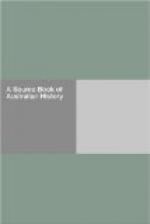This, I confess, my Lord, to be my opinion, and for this reason, that they will make connections with infamous characters here, whatever attention may be paid by their officers to prevent it; by this means they will in time be corrupted and rendered unfit people for the trust which we must repose in them. It might probably be thought expensive to relieve them as other garrisons, once in three, four, or five years; but I cannot help believing, my Lord, that the service would be much benefited by such a measure; and two forty-four-gun ships armed en flute sailing at a proper season would complete the relief, and return in from twelve to fourteen months, frequently less. The expense attending this measure will probably be an objection; but, my Lord, although the saving to be made by it may appear too remote to merit immediate notice, yet I am convinced it would ultimately prove a saving, and no inconsiderable one.
I have, etc.,
JNO. HUNTER.
(Enclosure No. 1)
STATEMENT OF THE CASE OF JOHN BAUGHAN
John Baughan who officiates as foreman of the carpenters working at Sydney, and a private soldier of the New South Wales Corps, of the same profession, had some dispute when formerly working together on an occasion when Baughan had the direction. This dispute, it appeared, had not subsided in the mind of the soldier, and probably was not wholly forgot by the other. It, however, was more conspicuous in the soldier, from the following circumstance:—One day when sentinel over a storehouse, knowing that Baughan was at work in a house some distance from his post, he set his arms down against the wall of the store, and seeing a man whom he knew, standing on the outside of the building in which Baughan was at work, entered into a conversation with him, of which Baughan was the subject, and in which much abuse was bestowed which it was meant that he, Baughan, should hear. Baughan went out at the back door unperceived, and seeing the soldier without his arms, went to his post, where he found the musquet, which he took up and carried to the guardhouse and delivered to the sergeant of the guard. The soldier was, of course, taken notice of and relieved, being without his arms. The next day, 5th February, at half-past nine o’clock in the forenoon the whole of the corps off duty at this place assembled, and in the most public and tumultuous manner proceeded to the dwelling of John Baughan, broke open his gates, doors and windows, entered his house, chopped the corner-posts of it, broke his bedsteads and bedding, chairs, window-frames, drawers, chests, and, in short, completely demolished everything within his possession to a considerable amount, for the man had by great labour and industry built himself a neat house and had it well furnished.




